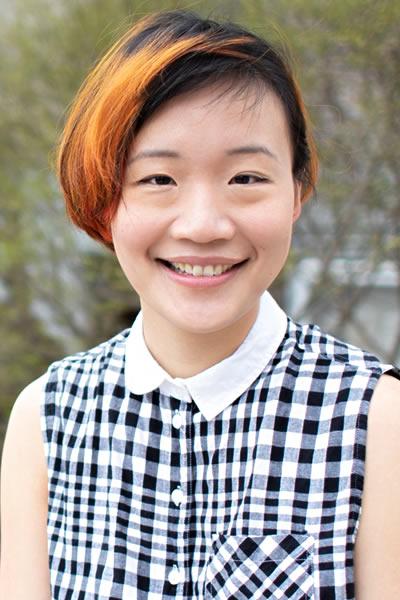Art Talk with NEA Literature Translation Fellow Jennifer Shyue

Photo courtesy of University of Iowa
In her home country of Peru, writer and poet Julia Wong Kcomt’s extensive body of work has helped draw attention to Peruvians of Chinese descent – which some scholars estimate make up nearly 10 percent of Peru’s population.
NEA Translation Fellow Jennifer Shyue is bringing that work to the United States as Wong Kcomt’s English translator. She has already translated one of Wong Kcomt’s 20 poetry collections and, with the support of a $15,000 grant from the NEA, she will tackle two more, A Blind Salmon and Dead Gold.
Shyue is an accomplished translator focusing on contemporary Cuban and Asian-Peruvian writers, translating both poetry and prose. Her work has been published in Poetry Magazine, McSweeney’s, and Guernica, among other literary journals.
Shyue sat down with the NEA via video conference to discuss her translation process, love of wordplay, and friendship and working relationship with Wong Kcomt.
NEA: What attracted you to translation as a creative process?
JENNIFER SHYUE: I took a translation workshop my sophomore year of college because it was in the Spanish department and fit some language requirements I had to do for my major, which was comparative literature. I just fell head over heels in love. I had done some creative writing in college and frankly, literary translation felt like all the most fun parts of writing fiction and very few of the more stressful parts. I’ve always loved reading and as they say, translation is the deepest form of reading. Being able to play both sides of the coin, both playing the role of the reader and then writing a translation, still brings me so much joy.
NEA: You said translation is like the best parts of writing. What you mean by that?
SHYUE: I would say playing with language and bringing a story to life, obviously in different ways as a writer of original work and as a writer of translation, is really fun – the work of weaving a larger piece together that then goes out into the world.
NEA: You speak a number of languages besides English, including Spanish, Portuguese, and Chinese. Is there a reason you chose to translate works in Spanish?
SHYUE: It’s sort of another accident. I took Spanish as my foreign language in high school and continued into college. I also did a gap year through my university in the Sacred Valley of Peru. So, that gap year how I landed on one of my regional focuses. [It also] deepened my relationship with Spanish.
I think coming to understand for the first time in college that the Asian diaspora isn’t just limited to the U.S. – even though the way we talk about it here, one might come to believe that – added fuel to the fire for wanting to learn more about these communities, a lot of whom are writing in Spanish and also Portuguese.
NEA: You received your NEA fellowship to translate two poetry collections of Julia Wong Kcomt. What was your first introduction to her work? What drew you to her writing?
SHYUE: I first found out about Julia’s work in a book of scholarship by the scholar Ignacio Lopez-Calvo called Dragons in the Land of the Condor – it’s about Chinese-Peruvian writers. There are a number of writers in the book, a few of whom I’ve translated, but I was especially drawn to Julia and continued to really resonate with her work because a lot of her themes, what you might call obsessions, are also ones I share. Whether it’s the body, motherhood, gender, identity, how identity is bound up with our ties to the places we’re in, multilingualism – all of those are things I find interesting as a reader, as a writer, and as a translator. Her work continues to inspire, excite, stimulate me, as does my friendship with her as a person.
NEA: Does your friendship with Wong Kcomt inform your translations? How so?
SHYUE: It definitely informs my translations. It’s been really wonderful to have access to her, and often she so generously shares where the seed of a poem or a piece originated. I very much believe in translation as a collaborative process, so getting her instincts on what feels right and what feels wrong is also really helpful.
Getting a behind-the-curtain look at the themes in her life that make for some of the themes in her work has been illuminating, and also really makes me really appreciate her as a person.
NEA: As you addressed, a lot of people in the States have this idea that the Asian diaspora is just confined to the U.S. What value do you think Wong Kcomt’s work and themes have for an American audience who don’t have access to those books in Spanish?
SHYUE: I’m a little leery of the idea of literature as ethnography or glimpses into the essence or soul of a community. What I’m really hoping to do as a larger project is help foster some conversations – part of that is very literally bringing work that hasn’t been published in the U.S. to the U.S. and making it accessible to a wide swath of readers by translating it into English.
Julia is already very much in conversation with writers from all over, including the U.S., and that conversation feels a little unidirectional sometimes, broadly speaking.
NEA: You translate both poetry and prose – do you feel there is a difference in the process of translating one versus the other?
SHYUE: The experience of translating poetry and prose definitely feels different, generally. I would say that because the real estate of poetry, just how much space it takes on the page, is often so much more compressed, it feels like I’m poring over the words at a slower pace.
I recently worked on a novella by the Japanese-Peruvian writer Augusto Higa Oshiro that really felt like translating poetry but in prose form because he bends prose convention in a lot of ways and also pays a lot of attention to language. I felt myself getting more tired more quickly because it felt like my attention had to be sustained for longer units – there are more pages to tackle as a unit. The unit of a piece of prose is often longer words-wise than a unit piece of poetry.
NEA: What is it like getting into the heads of individual writers or working within the scope of their voice and then transitioning into translating another writer’s work?
SHYUE: As readers, we move very easily from one writer to another. I’m translating first as a reader: what am I finding exciting, interesting, strange about this piece of work I’m looking at? I’ve been lucky to have interacted with pretty much all the writers I’ve translated. So, that’s been really great. The relationships are different because people are different, but I try to bring a collaborative spirit to whatever piece of work I’m translating, whether it’s a one-off because someone asked me to or it's a relationship I’ve cultivated across years and across different pieces of work. It’s always a pleasure to be in conversation with the writer.
NEA: Is there a particular way that you approach that relationship when translating their work?
SHYUE: I try not to pepper the writers that I work with [with questions] just because I know it can get to be a lot if you’re seeing a new poem every day and having to respond. So, generally, what I do with Julia is we’ll get on a call when we’re about to reach a milestone point, and I’ll show her all the poems and we’ll talk through them. I’ll talk about the questions I have, any stumbling blocks, points of curiosity, and it’s always really illuminating. Often, those calls stretch well over an hour, but she’s always incredibly generous with her time and her experiences and knowledge.
NEA: You talk about loving to play with words and there are so many languages across the world where there may not be a direct English translation for a word. How do you approach those moments?
SHYUE: I think that’s such an interesting question. Personally, I don’t believe in untranslatable words. We may not have exact corresponding words, but we can describe what that word means.
I also question this notion of literal translation. Every act of translation is interpretation. That’s what makes translation an art and its own form of writing. I think that is part of the process, bringing my lens as a reader to a work I’m translating. Readers are also interpreters, and moving those interpretations into words on a page is part of the great joy of translation.
The deadline to apply for the next round of translation project grants is January 12, 2023. You can learn more about applying on our Translation Projects page.





